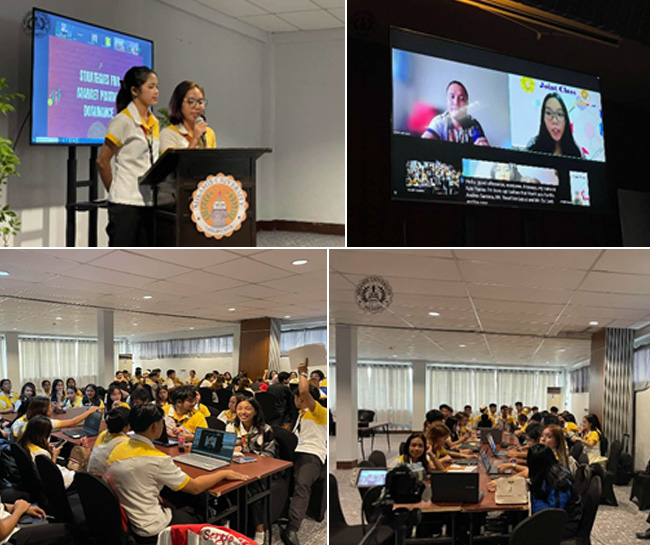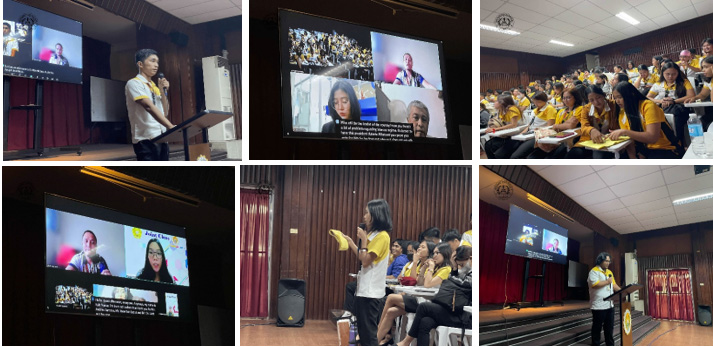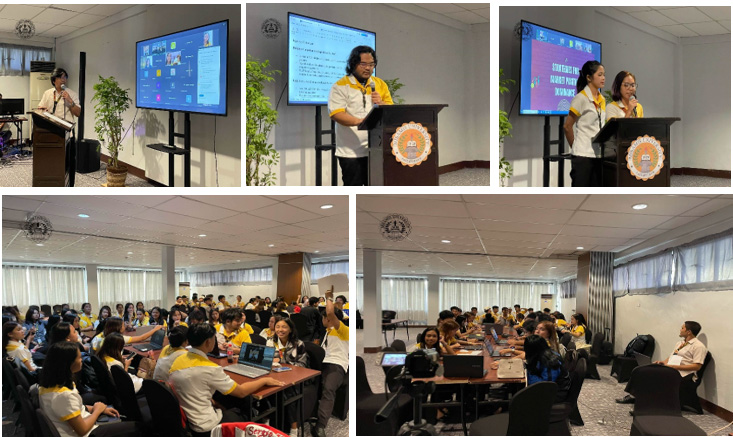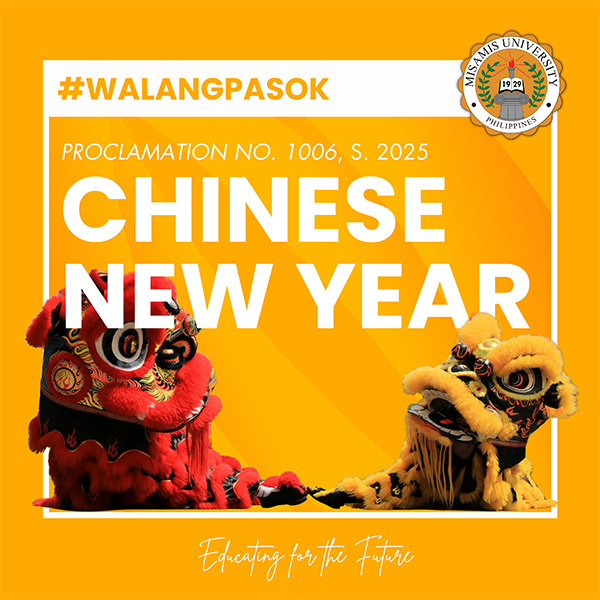
Misamis University and Universitas Persada Indonesia Y.A.I. Collaborate on a Five-Day Virtual Lecture Series on Market Structures in the Context of the Philippines and Indonesia
The College of Business and Management of Misamis University (MU) partnered with the Faculty of Economics and Business of Universitas Persada Indonesia Y.A.I. (UPI Y.A.I.) in Jakarta, Indonesia, to conduct a five-day virtual lecture series on Monopoly and Oligopoly as part of the Microeconomics course, a major subject for business students at both universities, for ensuring meaningful anf quality education for the students .Titled 'Virtual Joint Class Series on Microeconomics,'; the lecture series was held on October 24, 28, and 31, as well as November 7 and 21, 2024, from 3:00 p.m. to 4:30 p.m. (Philippine Standard Time) via Zoom.
The event engaged 84 second-year Bachelor of Science in Business Administration (BSBA) students from MU, majoring in Marketing Management, Financial Management, and Business Economics, along with 32 students from UPI Y.A.I.'s Faculty of Economics and Business. MU students attended the sessions at the university’s Function Hall, while UPI Y.A.I. students participated individually using their personal devices. The virtual classes were designed to align with the course learning outcomes of Microeconomics.
At Misamis University, the learning outcomes for these topics included: 1) understanding why certain firms become monopolists in the market; 2) formulating strategies to differentiate homogeneous products for competitive advantage; 3) analyzing the implications of the kinked demand curve in an oligopolistic market structure; and 4) examining the role of government in business and income distribution.
At Universitas Persada Indonesia Y.A.I., the course learning outcomes for these topics included: 1) developing a responsible attitude toward independent economic work; 2) adapting to economic changes with a global perspective; and 3) conducting comprehensive economic problem analysis based on contemporary management principles.
Furthermore, its Microeconomics course aimed to equip students with the ability to: 1) explain economic concepts, market scope, and market mechanisms; 2) analyze government policies and their effects on the economy; 3) evaluate costs, taxation, and their impact on consumer and producer surplus; 4) differentiate between perfect competition and monopoly markets; and 5) assess the decision-making process in monopolistic and oligopolistic markets, particularly pricing and production strategies.
The lectures were delivered by Dr. Endri Sentosa, SE., MM, from UPI Y.A.I. and Mr. Joseph Glenn Laput, LPT, MA, from MU. The sessions explored market structures under monopoly and oligopoly in the contexts of the Philippines and Indonesia.
Dr. Lloyd Ranises, the Linkage Officer, facilitated the virtual classes, introduced the lecture series, outlined the learning outcomes, and provided guidelines for student participation. Under the guidelines, each lecture was followed by an open discussion, allowing students to ask questions. Assignments were distributed at the end of every session and submitted via email to the Linkage Office. The fifth and final session focused on student assessment, which was conducted through essays and an online test using Google Forms.
First Day of Class
The first session, held on October 24, 2024, featured a lecture by Dr. Sentosa titled Market Structure. His discussion aimed to deepen students' understanding of monopolistic markets in Indonesia and analyze the regulations affecting businesses operating under this structure.
Dr. Sentosa utilized graphs and computations to illustrate demand curves, revenue trends, and long-term equilibrium in monopoly markets. To contextualize these concepts, he highlighted real-world examples of monopolistic industries in Indonesia, such as Perusahaan Listrik Negara (PLN), a state-owned electricity provider; Telkom Indonesia, the country's dominant telecommunications company; and PT Pertamina, Indonesia’s government-controlled energy corporation specializing in oil and natural gas.
Emphasizing the government's role in regulating monopolies, Dr. Sentosa discussed measures such as price controls, subsidies, and oversight mechanisms enforced by the Business Competition Supervisory Commission (KPPU) to prevent market abuses. Through this session, MU students gained valuable insights, developing a comparative understanding of economic regulations and the practical applications of microeconomic theories in a globalized economy.

Second Day of Class
Mr. Laput conducted the second session on October 28, 2024. The class began with a review of the previous lesson, during which Cheery Amor G. Hofeliña and Nea Aninao Sanchez from MU, along with Ilhan Mohammad Fazlurrahman and Najla Jennie Elkana Abyudaya from UPI Y.A.I., actively participated.
Mr. Laput’s lecture, titled Monopoly in the Philippine Setting, examined the impact of monopolies on the country's economic development. He began by tracing the history of monopolies in the Philippines, emphasizing their origins during the Spanish occupation when the Spanish government controlled tobacco production. This monopoly elevated the tobacco industry to prominence in both Asia and Europe.
Mr. Laput emphasized the negative effects of monopolies in Philippine history, particularly the exploitation of local farmers and laborers. He explained how monopolistic practices distorted local economies, leading to shortages of essential goods and shaping the Philippine market over time.
He further discussed the crucial role of government intervention in addressing monopolies, illustrating how unregulated market conditions could perpetuate economic distortions. By examining historical monopolies, he argued, students could gain valuable insights into contemporary economic challenges and the necessity of effective regulatory measures.

Third Day of Class
On the third day of the lecture series, Dr. Sentosa conducted a session with the joint class on October 31, 2024. Despite the Philippine government's declaration of October 31 as a half-day non-working holiday in preparation for All Saints' Day on November 1, the joint class proceeded as scheduled.
Dr. Sentosa’s lecture, titled Market Structures: Oligopoly Market, began with an overview of the characteristics of an oligopoly. He then examined Indonesia’s oligopoly markets, highlighting key industries dominated by a few major companies.
In Indonesia’s telecommunications industry, a small number of companies control the market, including Telkomsel, Indosat Ooredoo Hutchison, XL Axiata, and Smartfren, with Telkomsel holding the largest market share.
Dr. Sentosa emphasized the negative effects of oligopolies, explaining that limited competition often results in higher prices, slower innovation, and lower service quality. He stressed the importance of regulatory oversight by the KPPU in ensuring fair competition and protecting consumers from price manipulation.
The cement industry in Indonesia also exhibits oligopolistic characteristics, with a few major companies—such as Semen Indonesia Group (which owns Semen Gresik and Semen Padang), Indocement Tunggal Prakarsa (Tiga Roda), and Holcim—dominating supply and pricing. Their strong market presence allows them to influence cement prices and distribution.
Similarly, Indonesia’s banking sector is highly concentrated, with Bank Mandiri, BRI, BCA, and BNI leading in public fund-raising, lending, and digital banking services, making it difficult for smaller banks to compete.
In the air transportation sector, a few airlines dominate the domestic market, including Garuda Indonesia, Citilink (a subsidiary of Garuda Indonesia), Lion Air, and AirAsia Indonesia. The limited competition among these major airlines results in relatively uniform pricing.
The oil and gas sector also operates under an oligopolistic structure, with Pertamina, a state- owned company, holding a dominant position in the domestic fuel market and managing most of the country's filling stations.
Dr. Sentosa concluded by emphasizing the government's role in preventing monopolistic and collusive practices, such as price-fixing and market division. He highlighted the importance of government intervention in regulating prices, ensuring fair competition, and sanctioning companies that engage in anti-competitive behavior.

Fourth Day of Class
By the fourth session on November 7, 2025, students had become more interactive and engaged in discussions. By this time, they were more familiar with one another and felt more confident speaking in front of the joint MU-UPI YAI class. As a result, they gradually overcame their initial shyness and freely expressed their thoughts, making the session lively and engaging.
Vince Reyes and Khent Jayson D. Maluto from MU opened the session with an oral review of the previous lesson. Following this, Mr. Joseph Glenn Laput delivered a lecture focusing on oligopolistic firms in the Philippines, particularly in the telecommunications, energy, and food and beverage industries.
He discussed the economic implications of oligopolies, explaining that these firms often restrict production to maximize profits, which can slow overall economic growth. To address this issue, he proposed lifting foreign direct investment (FDI) restrictions to encourage more foreign companies to enter the Philippine market. He argued that increased competition would help reduce oligopolistic control and promote economic efficiency.
During the question-and-answer session, Dr. Ranises raised concerns about the potential risks of excessive FDI dominance in the Philippines. He noted that lifting FDI restrictions could lead to an influx of foreign-owned products and heightened dominance of multinational corporations, potentially disadvantaging local industries. He asked Mr. Laput to elaborate on strategies to mitigate these risks. The exchange of insights allowed students to critically examine government regulations and their impact on market structures.

Fifth Day of Class
The final session was dedicated to assessment. Mr. Laput prepared guide questions for an essay, which students presented orally. The essay focused on companies with oligopolistic control in the Philippines and Indonesia.
Vince Reyes and Khent Jayson D. Maluto analyzed the Philippine telecommunications industry. Meanwhile, Sandara Salvador Buhisan and Nea Aninao Sanchez from MU, along with UPI YAI students, examined the beverage industry, specifically soft drink companies.
The essays covered the following key points:
- Background of the companies
- Market behavior, including research on price-fixing, collusion, and non-price competition
- Strategies used by companies to maintain market dominance and their effects on consumers
- Government regulatory actions addressing oligopoly
Students from MU and UPI YAI were divided into groups, each focusing on at least one company. They presented their findings orally, followed by an assessment test conducted via Google Forms, where students achieved commendable results.
The five-day lecture series resulted in various learning outcomes. In general, students from both institutions gained a deeper understanding of different market structures. More importantly, they distinguished the differences between monopoly and oligopoly in the Philippine and Indonesian contexts.
The class broadened their perspectives, enabling them to compare economic conditions in both countries. They also gained valuable insights into the government's role in regulating markets to maintain a balance between monopoly and oligopoly.
Beyond academics, the sessions fostered camaraderie and cooperation among students from both institutions. This created an atmosphere of cultural exchange and strengthened their communication skills as they engaged with peers from another country. Through discussions and assignments, they developed the ability to engage in meaningful conversations with international students.
Ultimately, the joint class series deepened their understanding of the Philippine and Indonesian economic landscapes, particularly in the context of monopoly and oligopoly markets. It also provided valuable insights into how governments address economic challenges to sustain a healthy economy, balanced markets, and efficient supply chains.

Announcement

|

|

|
Photo Gallery
 Turnover of solar energy management from WEGEN to MU
Turnover of solar energy management from WEGEN to MU
|
 MU Sinulog Celebration 2026
MU Sinulog Celebration 2026
|
 MU Winter WonderLand Christmas Party 2025
MU Winter WonderLand Christmas Party 2025
|
Videos

|

|

|















